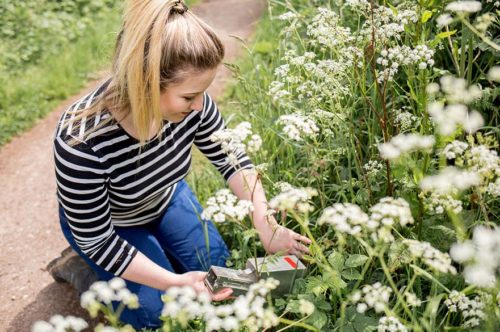Wildlife biology is the study of organisms, their behaviour, ecology, environment and management. On USW’s unique International Wildlife Biology degree you will study and interpret the biological processes and interactions that determine species diversity and distribution, their responses to biotic and abiotic factors, and apply current scientific thinking and practices to wildlife biology research and management in globally changing landscapes.
There is a strong practical field element to this International Wildlife Biology course, providing opportunities for immersive learning on three continents. You will study the wildlife and habitats of different landscapes in South Africa, which is a compulsory component of the course.
You will also develop your scientific skills on UK field trips, and have the option to apply research techniques in the tropical forests and coral reefs of Asia or Central America.
Typical study subjects include big game tracking, conservation genetics, wildlife management, ecology, vertebrate zoology, marine and freshwater biology.
What you will study
Year One: International Wildlife Biology Degree
- Big Game Tracking (South Africa field course)
- Biological Research Skills
- Microorganisms and the Dynamic Cell
- Principles of Ecology
- Evolutionary Botany and Zoology
- Genetics and Evolution
Year Two: International Wildlife Biology Degree
- Patterns in African Biodiversity (South Africa field course)
- Conservation Genetics and Wildlife Management
- Ecological and Wildlife Assessment
- Vertebrate Zoology
- Environmental Modelling for Wildlife Management
Optional (one of two):
- Ethology
- Tropical Ecology and Conservation (Tropical field course)
Year Three: International Wildlife Biology Degree
- Wildlife Research Project (40-credits)
- Marine and Freshwater Biology
- Advanced Ecology
Optional (two of three):
- Global Ecological Change
- Humans and Other Primates
- Agriculture, Evolution and Biotechnology
Teaching
The International Wildlife Biology degree is taught through a combination of lectures, tutorials, laboratory sessions, computer exercises, practical classes, and UK and overseas fieldwork.
The number of hours of direct teaching you will receive per week will vary depending on the modules studied and year of study. Generally, you will have 48 hours of direct contact per (20-credit) module over an academic year, equating to around 12-15 contact hours per term week. Outside of this time, you will be expected to commit around 80 hours to study guided by your lecturers and self-directed learning on each module (but more for your third year project). A further 70+ hours are normally required for students to prepare and complete assessments for each module. Residential field courses have more contact hours, supporting our hands-on approach to field learning.
Throughout your wildlife biology course we invite guest lecturers from the ecological and conservation sector to help support your knowledge and understanding of contemporary wildlife biology scenarios. This is also a great opportunity to meet with potential employers, along with field trips and collaborations on third year projects.
RESEARCH-INFORMED TEACHING
We are a research-active team. Our Wildlife Ecology research focuses on three main areas: Tropical ecosystem challenges; Upland landscape ecology and Biodiversity conservation. We investigate species, population and community relationships with anthropogenic drivers of change to biodiversity, ecosystems, and the provision of co-beneficial goods and services. Our outcomes inform conservation and restoration options, processes and policies that remediate impacts of anthropic activities. We undertake and support field research in the Azores, Costa Rica, Honduras, Indonesia, Ireland, Mexico, Pakistan, the Philippines, South Africa and the UK.
Assessment
You will be assessed using a combination of different assessment types, to support all facets of your learning and development. These include scientific reports and papers, oral presentations, critical reviews, digital outputs, problem solving and data analysis tasks, in-class and online tests, laboratory exercises, practical competencies, field reports and written examination.
Assessment methods vary depending on the module and year of study. A number of modules are assessed through coursework and written examination, while other modules are continuously assessed with coursework only.
The breakdown of assessment methods for this course is: 9-27% practical assessment, 19-59% coursework, and 32-54% written examination.
Zobacz więcej na stronie uniwersytetu >>
Wiza studencka do Wielkiej Brytanii
Aby studiować w Wielkiej Brytanii potrzebujesz wizy studenckiej. Aby złożyć wniosek o taką wizę studencką musisz zdjać certyfikat językowy na poziomie B2.
Uważaj! Do celów wizowych musisz wybrać wyłącznie egzamin w wesji Secure English Language Test (SELT) UKVI .
Co to jest test SELT UK VI registration? Przeczytaj więcej o testach SELT UKVI >>




















